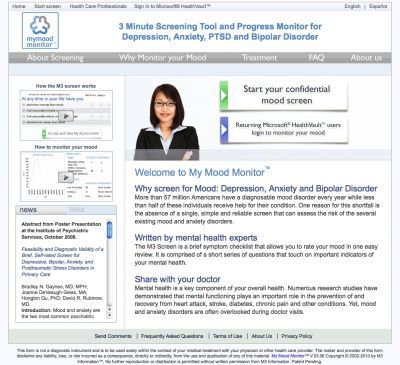Monitor your mood in three minutes with 27 questions

Your support helps us to tell the story
From reproductive rights to climate change to Big Tech, The Independent is on the ground when the story is developing. Whether it's investigating the financials of Elon Musk's pro-Trump PAC or producing our latest documentary, 'The A Word', which shines a light on the American women fighting for reproductive rights, we know how important it is to parse out the facts from the messaging.
At such a critical moment in US history, we need reporters on the ground. Your donation allows us to keep sending journalists to speak to both sides of the story.
The Independent is trusted by Americans across the entire political spectrum. And unlike many other quality news outlets, we choose not to lock Americans out of our reporting and analysis with paywalls. We believe quality journalism should be available to everyone, paid for by those who can afford it.
Your support makes all the difference.A new study proved that the My Mood Monitor (M-3) -- an online one-page secure questionnaire used to self-gauge mood and "relative risk for depression, an anxiety disorder, bipolar disorder and post-traumatic stress disorder (PTSD)" -- is a useful and effective diagnostic tool.
A new study proved that the My Mood Monitor (M-3) - an online one-page secure questionnaire used to self-gauge mood and "relative risk for depression, an anxiety disorder, bipolar disorder and post-traumatic stress disorder (PTSD)" - is a useful and effective diagnostic tool.
Researchers from the University of North Carolina at Chapel Hill School of Medicine (UNC) published their findings in the March/April edition of Annals of Family Medicine, a peer-reviewed research journal.
Bradley Gaynes, M.D., M.P.H, associate professor of psychiatry at UNC, led the study and explained those "who suffer from depression and anxiety-related mental health disorders never receives treatment because they don't understand what's wrong, and when they go to their family doctor these treatable illnesses are too often missed. For these millions of people and their primary care providers, the M-3 screener is a tremendously helpful resource."
The M-3 checklist specifically monitors for depression, bipolar disorder, anxiety disorders and post-traumatic stress disorder (PTSD) with questions about sleeping and eating patterns and emotional responses to specific situations. There is also the ability to create a private history with the health management tool to record physical symptoms, treatments, and medications. The data is then graphed with a symptom/burden score and progress can be viewed by month, quarter or year. Finally below a patient's graph are four graphs plotting depression, bipolar disorder, anxiety disorders and post-traumatic stress disorder (PTSD) separately to encourage self-tracking and comparison, plus a list of side effects that are associated with each condition.
The healthcare system in the United States and other countries places a great burden on general physicians to diagnose and treat psychiatric disorders. Gaynes confirms that the "initial diagnosis is made by a primary care provider, not by a psychiatrist. In addition, the majority of prescriptions for antidepressant medications are written by primary care physicians." The M-3 is one way a patient can engage with their physician in a valid, easy and informative manner.
By December, a smartphone application of M-3 is expected and the research team at UNC is creating a follow-up study to measure the long-term effectiveness of the M-3 checklist.
M-3: http://www.mymoodmonitor.com/
Study: http://www.annfammed.org/
Join our commenting forum
Join thought-provoking conversations, follow other Independent readers and see their replies
Comments